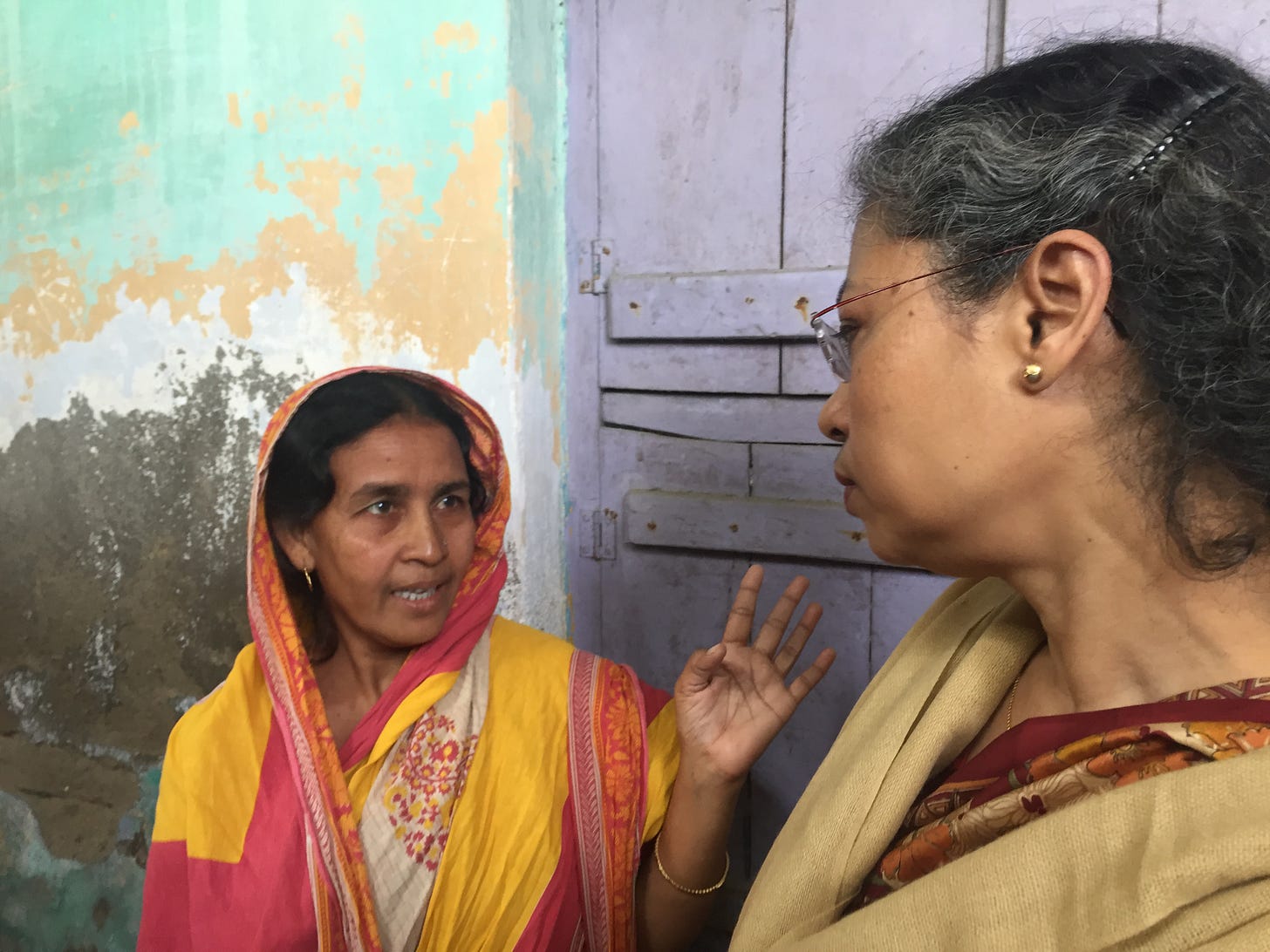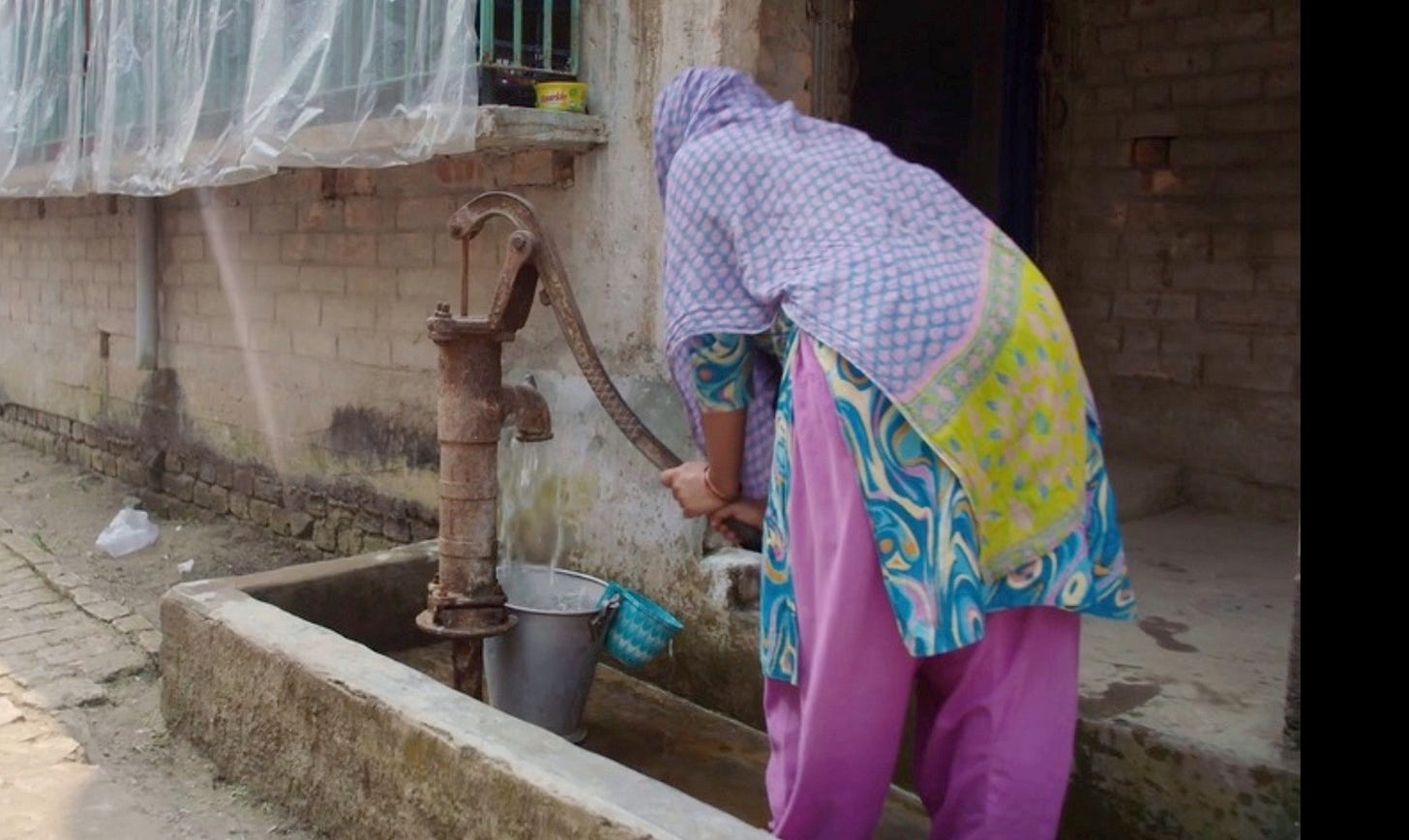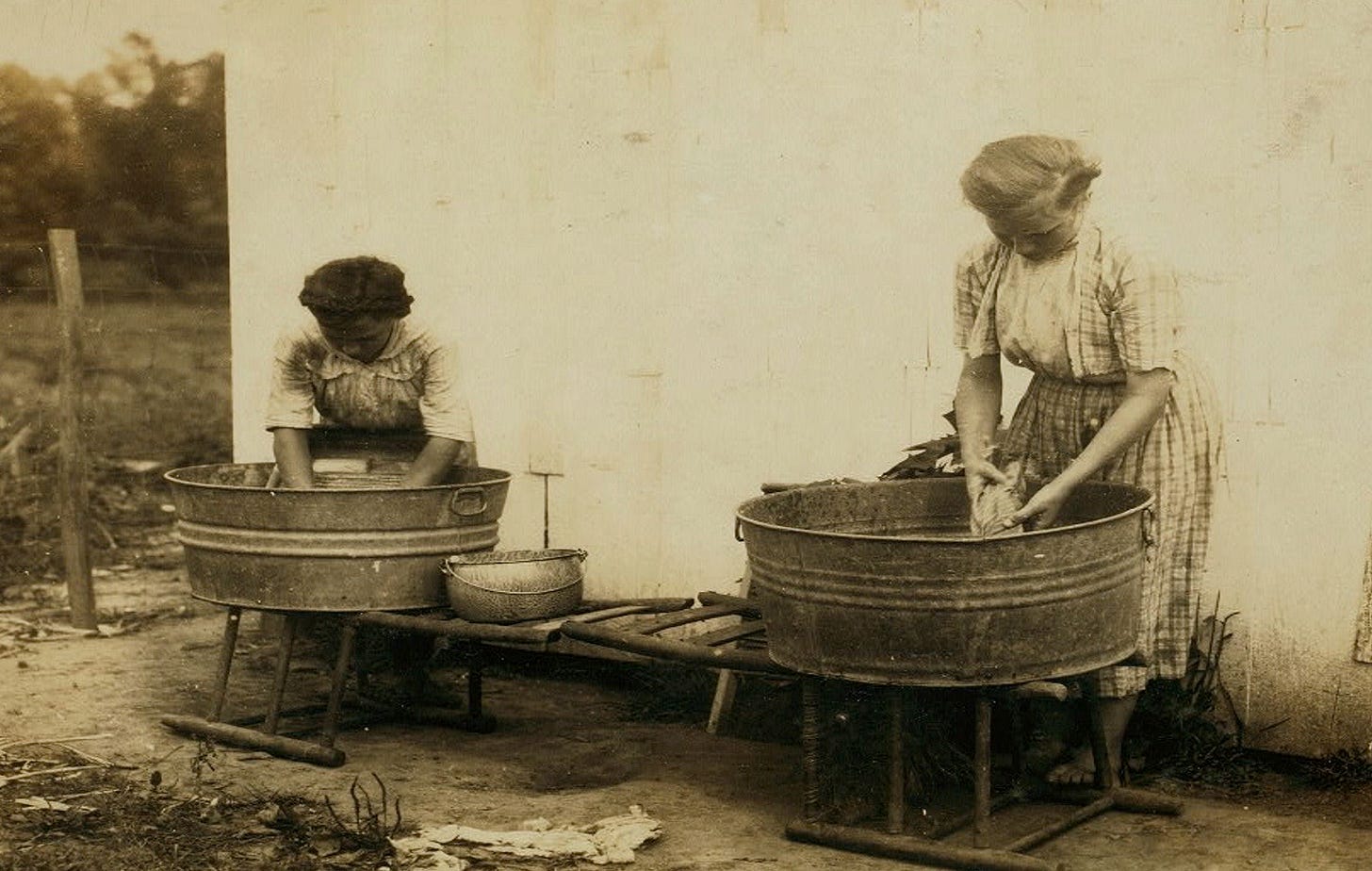Mothers, Electrified
Electricity emancipates women and girls from the pump, the stove, and the washtub.

When I met Rehena Jamadar, she was 44 years old. A soft-spoken, elegant woman, she had her first child, a girl, when she was 16. Two other children, a boy, and a girl, came shortly afterward.
Rehena lives in the village of Majlishpukur, a tiny agricultural settlement located southeast of central Kolkata in a region known as South 24 Parganas. The road to the village is intermittently paved with bricks and is barely wide enough for two full-size vehicles to pass safely. Most of the vehicles on the road had two or three wheels. Bicycles were the most common conveyance. Chickens, pigs, and dogs roamed freely. Rainwater collected in trash-strewn drainage ditches on both sides of the road. Smoke from dozens of small cooking fires had left a light blue-gray haze that softened the late-morning December sun.
My dear friend, Joyashree Roy, a professor at the Asian Institute of Technology in Bangkok, a senior fellow at the Breakthrough Institute, and a lead author of several reports issued by the Intergovernmental Panel on Climate Change, arranged our visit to Majlishpukur. She was our guide and interpreter.
Rehena’s modest home had been connected to the electric grid 14 years earlier. She led us to the side porch of her brightly painted home to show us her electric meter. She was getting cut-rate electricity thanks to the federal government’s electrification program. She paid the bill every three months. Inside her home were a few light bulbs, a fan, and an outlet in the kitchen. One of the things she liked best about having electricity was that kitchen work gets done faster. She was using an electric grinder to prepare the spices she uses in her food. Before electrification, she had to do that grinding by hand, which consumed much of her time in the kitchen.
I had lots of questions. Joyashree easily translated them into Bengali. What was it like before her home got electricity? What was it like now? Rehena told us about the beneficial impact that electricity had on her children. Thanks to electricity, her children were able to read books, practice their writing, and manage their schoolwork at night. That had had a clear and positive result: one of her daughters was attending college in Kolkata, a fact of which Rehena was clearly proud.
After we’d talked for a while longer, I asked Rehena: “If you had lived in a house that had electricity when you were growing up, would you have gone to university, too?” A brief smile flashed across her face and without a nanosecond of hesitation, she nodded her head to the right, in the way typical of many residents of West Bengal, and said, “Yes. I would have.”
There was no remorse. No bragging. No what-could-have-beens in her reply. Only a direct, matter-of-fact response that was almost as if I’d asked her if the sun was going to come up in the east the next morning.
Darkness had kept this gracious and intelligent woman from achieving something that she knew was within her grasp. Here was a person who — had she been born in one of India’s cities instead of a rural agricultural area — would have gone to college. With a college education, she might have become a teacher, doctor, lawyer, or maybe a nurse or engineer. By the time I met Rehena, I knew plenty of facts and statistics: the average resident of India uses about 800 kilowatt-hours of electricity per year, which is about a quarter of the global average. I understood the myriad correlations between electricity availability and health and wealth. But that 15-minute conversation that I had with Rehena and Joyashree made me see the light: Darkness kills human potential. Electricity nourishes it. It is particularly nourishing for women and girls.
Today is Mother’s Day.
I am recounting that 2016 trip to Majlishpukur because few technologies matter more to mothers and their daughters than electricity. Electricity emancipates women and girls from the pump, the stove, and the washtub.
There’s an old saying: “Educate the mother and you educate the child.” But mothers can’t get a good education if they spend their days hauling water, collecting fuel for the stove, and washing clothes by hand. According to Hans Rosling, the late Swedish academic and statistician, about 5 billion people on the planet are walking around today wearing clothes that have been washed by hand. That means that roughly 2.5 billion women and girls — as part of their daily, or weekly routine — are washing those clothes. By hand. In buckets. Or washtubs. And every minute, every hour, every day, that women and girls spend at the washtub is one missed in the classroom, bookstore, or library.
In one of his most-famous presentations, a TED talk he did in 2010, Rosling declares, “To my grandmother, the washing machine was a miracle.” (Watch the YouTube video below.) He tells an enchanting story about the day his family got a washing machine and how his grandmother insisted that she be the one to push the button to start that first load. It’s a vivid reminder of how recent electricity is in human history, how wondrous it is, and how we take it for granted. For proof of that last point, listen to the audience chuckle as Rosling recounts the story.
Indeed, this isn’t ancient history. My maternal grandmother, Agnes Conway Mahoney, who was born on a farm in 1898 near Billings in what was then Indian Territory, grew up washing clothes by hand.
Washing machines may be the single most important device in elevating the status of women and girls. Around the world today, hundreds of millions of women and girls who live in electricity poverty have never experienced the convenience of a washing machine or refrigerator, to say nothing of the wonders of a Cuisinart or Instant Pot.
During the New Deal in the 1930s, increasing the use of washing machines was a major motivation behind the establishment of the Electric Home and Farm Authority. The agency was created to develop and foster “increased use of electric power through the double reduction of cost of electricity to the consumer and the cost of electrical appliances.” The agency helped rural residents borrow money at low interest rates so they could purchase washing machines, ranges, and refrigerators. The appliances were sold through local utilities and electric coops. By 1938, more than 74,000 contracts had been signed, representing more than $11 million in appliance sales. (That’s about $236 million in 2023 dollars).
In their advertising campaigns in the 1940s, 50s, and 60s, electric utilities targeted women, encouraging them to increase their use of electricity. The most famous of those marketing efforts was the cartoon character Reddy Kilowatt. Created in 1926 by Ash Collins, the communications manager for Alabama Power, Reddy would go on to star in numerous commercials and print ads. By 1957, more than 200 utilities around the world had licensed Reddy in one form or another. Dubbed “your tireless household servant,” Reddy aimed his message directly at women. In animated clips like the one below, Reddy danced around the house, bouncing off of the appliances, while singing the ditty: “I wash and dry your clothes, play your radios, I can heat your coffee pot…”
Numerous studies have shown the positive effect electrification has on women and girls. A 2002 study in Bangladesh by Abul Barkat, an economist at the University of Dhaka, found that the literacy rate for females in villages with electricity was 31 percent higher than it was in villages that lacked electricity. The study concluded that the availability of electricity has a “significant influence on education, especially on the quality of education. This influence is much more pronounced among the poor and girls in the electrified households than the poor and girls in non-electrified households.”
A 2010 study on post-apartheid electrification in South Africa found that “employment grows in places that get new access to electricity.” This was particularly true for women. The study found that electrification led to “large increases in the use of electric lighting and cooking, and reductions in wood- fueled cooking over a five-year period, as well as a 9.5 percentage point increase in female employment.”
A 2012 study of rural electrification in India concluded that the availability of electricity had a significant impact on schooling for girls, finding: “electrification access increases school enrollment by about 6 percent for boys and 7.4 percent for girls. It also increases weekly study time by more than an hour, and the increase is slightly more for girls than boys.” It also found that “The impact of electrification on labor supply is positive for both men and women; that is, household access to electricity increases employment hours by more than 17 percent for women and only 1.5 percent for men.”
Complex studies aren’t needed to show that extreme shortages of electricity are the common factor in counties where women and girls are cursed with illiteracy and child marriage. World Bank data shows that the countries with the highest rates of female illiteracy are all in what I call the Unplugged World, where electricity use is less than 1,000 kilowatt-hours per capita per year. If you are a female in an impoverished country and you don’t have access to electricity, you are effectively a slave to the physical chores of the household: hauling water, making fires, grinding grain, and washing clothes.
In 2014, the United Nations Childrens’ Fund, released its “State of the World’s Children” report. It’s a sobering document that details the plight of children around the world, and in particular, the plight of girls. Among the aspects examined was the issue of child marriage, that is, cases in which girls are married before the age of 18. The report listed the top 10 countries with the highest rates of child marriage: Niger, Central African Republic, Chad, Bangladesh, Mali, Guinea, South Sudan, Burkina Faso, Malawi, and Mozambique.
In 8 out of those 10 countries, per-capita electricity use is so low that the World Bank doesn’t provide data for them. Only two of the ten — Bangladesh, (279 kilowatt-hours per capita per year), and Mozambique (440 kilowatt-hours per capita per year) — were using large enough amounts of electricity to be listed in World Bank data sets.
After we visited Majlishpukur, I did a formal interview with Joyashree Roy. I asked her how policymakers should think about electrification in poverty-stricken places like India, particularly given electricity’s importance to women and its role in climate change. She said, “You cannot deny them this access to modernity.” She continued, saying that for “the rest of the world who is enjoying modernity, and we are not allowing others to be modern, is a crime, it is a major crime.” Electricity, she said, is essential to women. “If your mother is educated then she understands the beauty of knowledge,” Joyashree told me. If women don’t have electricity, and therefore, miss their opportunity to be educated, then, “we are missing two generations, mother and the girls.”
Bringing electricity to the hundreds of millions of women and girls who are still living in the dark is one of the greatest challenges of the modern age. Bringing those mothers and daughters out of the dark and into the bright lights of modernity won’t happen quickly. It won’t be cheap or easy.
Nevertheless, today is Mother’s Day. It’s a day to celebrate mothers. It’s also a day to celebrate the miraculous inventions — electricity, washing machines, electric stove tops, Cuisinarts, and Instant Pots — that have changed our world for the better and liberated women and girls from the drudgery that cursed untold generations of their foremothers.
Note: This article is adapted from my latest book, A Question of Power: Electricity and the Wealth of Nations. The paperback edition of the book will be published on Tuesday, May 16. Please buy a copy. (Remember, you don’t have to read it, you just have to buy it.) My interview with Rehena in Majlishpukur, the interview with Joyashree Roy — and a special appearance by Reddy Kilowatt — can be seen in Juice: How Electricity Explains the World, the feature-length documentary film I produced with my colleague, Tyson Culver. Juice can be found on all of the major streaming platforms. It’s also available, for free, on YouTube.






Thanks for this!
My husband's grandmother, Marika, who lived in the Pindos mountains of Greece, spent much of her life washing clothes by hand, washing dishes, hauling water with a donkey from the local spring, rounding up firewood, and raising five children. Her village was gradually electrified in the 1970s and 80s, but by that time, she was already a grandmother. She too was very smart, but given the demand for physical labor, education was out of reach.
Even in my own lifetime here in Western North America, the development of highly reliable dishwashers and integrated washer/dryer machines have further reduced the burden of labor on women.
Still, some things don't change. Childcare is still labor intensive and rewarding. I'm happy I got an advanced degree in electrical engineering, and love working as an electronics design engineer, but I would not have traded away the years I spent as a stay-at-home mom to have had a CV that has the work profile of a man.
It is so naive, if not evil, to close down low cost nuclear and nat gas power in the name of helping people or globe.
Doublely naive when one realizes that replacements for these, ie coal, lead to higher co2 in atmosphere.
Another impact of closing down clean conventional energy is demand suppression through higher costs electricity, or blackouts. This has even great social damage.
In “wealthy” locals like California and NY, the damage is mostly economic, as budgets for teachers’ salaries, community housing, and gifted students programs and graduate programs at top state universities are impinged, or taxes on employers and innovative corporations increased.
But as Bengali story implies, in rural undeveloped locals, the burden of making cheap electricity unattainable is far more than economic, it impacts society, culture and social justice.